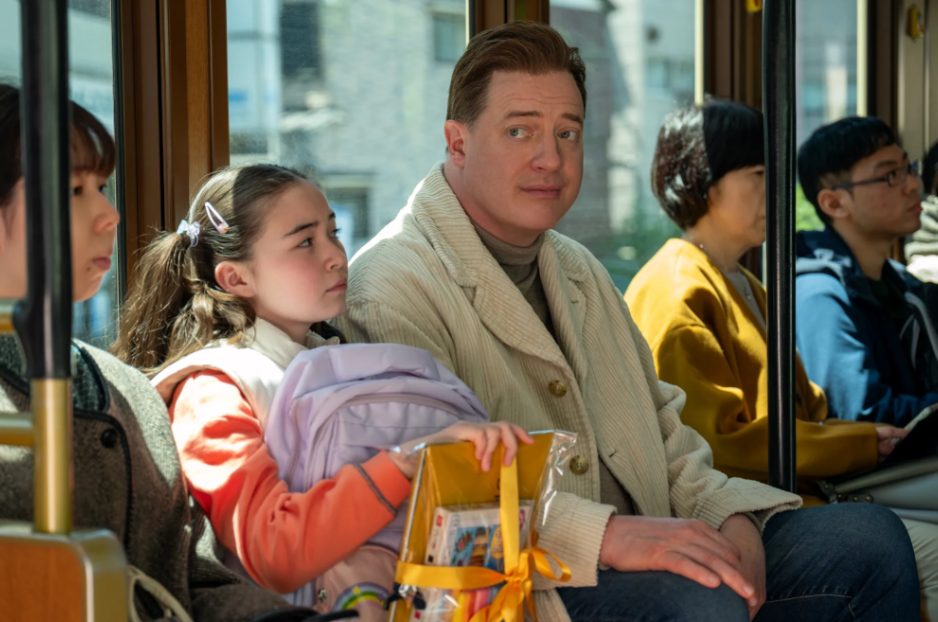Image courtesy of Searchlight Pictures
Spotlight Presentation of the 61st Chicago International Film Festival
RENTAL FAMILY— 4 STARS
To fully accept the societal and emotional terrains of Hikari’s outstanding dramedy Rental Family, one is required not so much to make an enormous leap into a lurid scenario, but rather, let’s say, a long step. You will need a stretched lunge forward that closes the typical arm’s length of observational distance from something you don’t entirely know or accept. That gingerly-taken step merges you into a different comfort zone than your own. If you can do that, you will match the united heartbeats of Rental Family and come to value the warm and cozy rhythms the film creates and offers willingly to share.
LESSON #1: INTRODUCE YOURSELF TO RENTAL FAMILY SERVICES— Rental Family selects a very specific central “workplace” in modern-day Tokyo, a city with a hustle-and-bustle all its own. Since the 1990s, the metropolis has seen the growth of “rental family services,” where actors are available for hire as stand-ins for any number of needs, from family gatherings and business events to short-term platonic relationships. Go ahead and picture it. Imagine hiring your own cheering section for home or work. It is, no doubt, a foreign concept to most arriving at the film, yet this is the necessary long step, and Rental Family holds your hand through it.
Our assigned outsider learning this tangent of subculture is the fledgling American actor Phillip Vandarploeug, played by Academy Award winner Brendan Fraser. He’s been working primarily as a cheesy commercial actor and background actor for a few years in T-town, chasing auditions, living alone, learning conversational Japanese, and standing out like a sore thumb with his tall, robust frame. He answers an audition call for an “experience” without much detail. Running late, he arrives to be a guest at a very unique funeral.
Taken aback for a moment until the curtain-pulling end, Phillip is pitched by the event’s organizer, Shinji Tada (Takehiro Hira of Gran Tourismo and Captain America: Brave New World) to join his rental family agency for more of these types of “specialized performances” as the “token white guy.” Intrigued by the effectiveness of the job and a steady gig, Phillip accepts the invitation and joins Shinji’s small troupe of actors, alongside Aiko Nakajima (Mari Yamamoto of Monarch: Legacy of Monsters) and Kota Nakano (Tokyo Vice’s Kimura Ben). Quickly put into the thick of it, Phillip’s next role is playing a Canadian fiancé for a traditional Japanese wedding that allows the closeted lesbian bride familial acceptance and an escape route to go overseas with her true significant other.
LESSON #2: SELLING EMOTION— What Phillip comes to learn is that this level of improvisational and no-second-take acting requires him to sell emotion to a vivid degree. Clients of Shinji’s rental service aren’t looking for strict replacements of what is missing, per se, as much as a shortcut to improved connections that benefit their social standing and, underneath, their mental health. Actors like Phillip and Aiko arrive in their roles immediately docile and accommodating to the client’s needs, removing much of the messy maintenance required by several versions of real relationships. Essentially, they embody affordable convenience and ideal optics. That said, the screenplay from Hikari and co-writer Stephen Blahut does not shy away from the occasionally problematic and self-serving circumstances of these sought-after services, as seen in a strong subplot featuring Aiko’s frequent use as an “apology” proxy for adulterous husbands.
The double-edged sword of this immersion for Phillip in Rental Family is the guilt of being part of living sizable lies amid what are unique professional chances for him to play roles with real meaning after a string of dead-end bit parts. He discovers those challenged morals and blurred lines in his next two placements, first as a journalist for a fake publication interviewing a former great Japanese actor, Kikuo Hasegawa (Akiro Emoto of Shin Godzilla), for a biography piece, and second as the overseas father of an elementary school girl, Mia (newcomer Shannon Mahina Gorman), whose affluent single mother (Shino Shinozaki) needs a co-parent for the application and interview process of a prestigious private school. These are longer assignments, requiring more immersion and commitment.
LESSON #3: FILLING LONELINESS— This expansion of Phillip’s work into these concurrent roles transforms Rental Family into both a father-figure and an off-kilter buddy movie with Brendan Fraser at the doubled and heavy forefront. After initially bumpy and frosty starts, Phillip endears himself to both Mia and Kikuo. The beautiful thing about a lonely man—and, make no mistake, that’s precisely what Phillip Vandarploeug is beneath the charismatic, showy shell of a trained actor—learning and performing the activities and monologues to emulate the love of a father, friend, listener, and confidante rubs off on the person going through those motions. One could argue Rental Family only needs one of these two main plotlines for Phillip, but what’s woven together enriches the central character in different ways and lands reasonably balanced in the hopscotch of screentime and scene changes.
Hikari (37 Seconds) and the voyeuristic camera of cinematographer Takuro Ishizaka (Knuckle Girl) use Fraser’s size difference, hints of middle-aged softness, and sparkling blue eyes to their frame-filling advantage to place their star into that aforementioned nudged long step. With those glowing and disarming traits, the lovable Oscar winner could capture the hearts of the most bulletproof and armored tickers of any crowd. Like the entire film itself, longing to manufacture affinity, we are gifted an absolutely crowd-pleasing treat in Brendan Fraser.
LESSON #4: ENDINGS HURT— Phillip’s transformative experiences lead to a slight Pretty Woman effect in Rental Family, where the hired employee or undercover person falls for the role, and doesn’t want to or know best how to exit their place when the work is done. We—and his bosses—know it has to end, creating the question of graceful exits or hard severances in the third act of the film, and the looming effect either of those goodbyes, or lack thereof, will have on the real and pretend people involved after the amount of quality time shared.
Even if all of the so-called journey in Rental Family is orchestrated to be fake and intentional from the nature of the business at hand, by golly, we find ourselves inspired and comforted by the honesty and fulfillment this fine film sheds light on within an unorthodox cottage industry. We see assistance that, as strange as it may seem to someone unfamiliar with the service-rooted possibilities, stands as crucial and nonjudgmental help for those seeking it out. The vulnerability of longing souls healed, even temporarily, but a heart too big for the job loosens the seriousness of life in winsome and empathetic ways.
LOGO DESIGNED BY MEENTS ILLUSTRATED (#1353)



